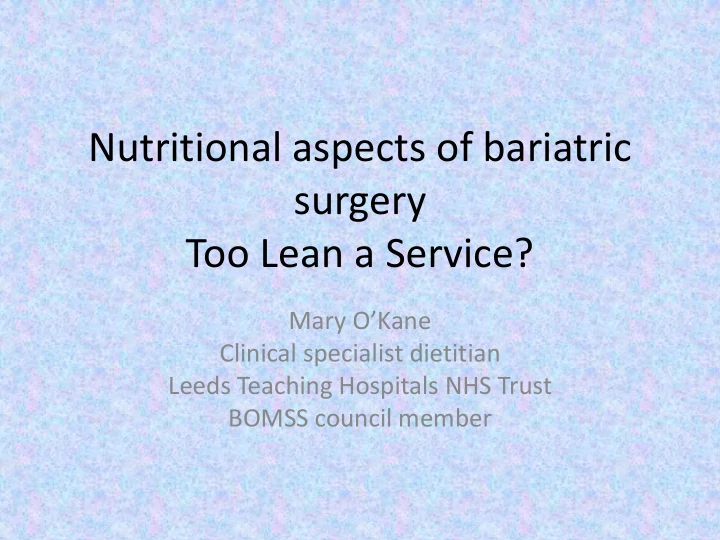

Nutritional aspects of bariatric surgery Too Lean a Service? Mary O’Kane Clinical specialist dietitian Leeds Teaching Hospitals NHS Trust BOMSS council member
Does surgery result in a better diet? • Decreased intake of sweets and sugary drinks but tolerance increases with time, high intake of salty snack foods (Brolin et al 1994) • Decrease in energy from protein and increase from sugar and alcohol, decrease in prepared meals and increase in sweet foods (Lindroos et al 1996) • Patients may end up snacking more and eating less regular meals (grazing), poor intake of protein, vitamins and minerals, intakes of iron, zinc, vitamin D below requirements (Naslund et al 1998) • 37% had resumed snacking 1 year after gastric bypass (Elkins at al 2005) • Cravings for sweets results on significant less weight loss (Burgmer et al 2005)
Self reported post operative dietary compliance and weight loss after gastric bypass Sarwer et al. SOARD 4 (2008) 640 – 646
Role of the dietitian As a core member of the MDT: • Initial assessment of diet, nutritional status and eating behaviours (and psycho-social factors) • Advice and support on the appropriate diet • Monitoring of micronutrient status • Individualised nutritional supplementation, support and guidance to achieve long-term weight loss and weight maintenance NICE CG43 Obesity 2006
NICE CG43 Obesity Bariatric surgery All appropriate non-surgical measures have been tried but have failed to achieve or maintain adequate, clinically beneficial weight loss for at least 6 months The person has been receiving or will receive intensive management in a specialist obesity service The person commits to the need for long-term follow-up.
Too lean a Service? Dietetic input Pre-referral • No documented evidence of pre-referral dietetic input in 65% cases Post-referral • 22% patients not assessed by a dietitian prior to surgery • 27% patients, no evidence of dietetic input prior to surgery
Adequacy of dietetic input pre-surgery Too lean a service? Adequate Number of % for those Number of % for all dietetic patients¹ with evidence patients (for all patients assessment (for those with patients) /education for evidence) patient Yes 195 92.9 200 77.5 No 15 7.1 58 22.5 Subtotal 210 258 Insufficient 27 123 data Total 237 381
MDT meeting
Discharge summary Too Lean a Service? Poor / unacceptable • Diet information (10 patients) • Emergency contact (9 patients) Inappropriate discharge prescription • Lack of vitamin supplements (10 patients) • Inappropriate vitamin B12 (1 patient)
Follow-up Too lean a service Types of follow-up clinic Follow-up clinics Number of hospitals (105) Bariatric surgeon 95 Dietitian 86 Specialist nurse 58 Psychologist/ psychiatrist 24 Bariatric physician 21 Other 2 72/102 hospitals gave early telephone follow-up
Dietary related problems following bariatric surgery • Dehydration • Dumping syndrome • Nausea and vomiting • Loss of appetite / Anorexia • Regurgitation • Fear of stretching the • Food intolerances pouch • Constipation • Return of appetite • Diarrhoea /steatorrhea • Alopecia
Bariatric procedures, vitamins and minerals Vitamin mineral Pre-surgery AGB Sleeve RYGB BPD +/- DS deficiency / gastrectomy Surgery Thiamin Uncommon Uncommon Uncommon Uncommon Uncommon B12 10-13% Uncommon Uncommon 12-33% Uncommon Folate Uncommon Uncommon Uncommon Uncommon Uncommon Iron 9-16% of Uncommon 20-49% women Vitamin A Uncommon Rare Rare Rare but can 50% at 1 occur year 70% at 4 years Vitamin D 60-70% Common V. Common Zinc Uncommon May occur Common Protein Uncommon May occur May occur May occur May occur
Protein – energy malnutrition / protein malnutrition • Food intolerance / Eating habits /Compliance • Anorexia / loss of appetite • Stricture / too tight a band • Diarrhoea • Requirements of BPD/ DS higher
Implications of “Too Lean a Service?” • All patients being considered for bariatric surgery should receive dietary assessment and education prior to referral and definitely prior to surgery • The dietitian is the key MDT member to undertake this assessment, education and provision of follow-up support • Psychological assessment and support should be available • Dietetic advice including vitamin and mineral supplements and discharge advice needs to be clearly documented
On-going work • BOMSS training for dietitians and other healthcare professionals • “Providing bariatric surgery” - the BOMSS Standards for Clinical Services & Guidance on Commissioning • Clinical Reference Group on Morbid Obesity – comprehensive patient pathway • Vitamins and minerals and pre- and post-surgery nutritional monitoring guidelines – work in progress
Recommend
More recommend